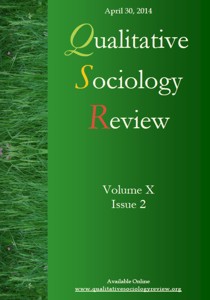“The Machines Don’t Lie”: A Study of the Social Production of Mechanization in the Determination of Voter Intent
DOI:
https://doi.org/10.18778/1733-8077.10.2.03Keywords:
Ethnomethodology, Ethnography, Voter Intent, Electronic Voting, Machines, Mechanization, Counting, Practical ReasonAbstract
Because election results are the essential measure of the popular will in liberal democracies, accurate determination of voter intent is a necessary pre-requisite since “what [N] does is not simply make a mark on a piece of paper; he [sic] is casting a vote” (Peter Winch). If every vote counts, then every valid vote must be counted – which means seeing the mark on the paper as intentional action. But, electronic voting systems are increasingly used in Canada. Given the operational vagaries of the use of such machines, the paper asks: How is voter intent mechanically achieved as a practical, social accomplishment of the human beings charged with working the machines and counting the votes?
The paper then reports a case study of the tallying of ballots in one municipality in a recent Ontario municipal election where the official result between the two top candidates was a difference of one vote. It focuses on the social production of mechanical consistency in the determination of voter intent during the recount process.
Downloads
References
Allers, Maarten A. and Peter Kooreman. 2009. “More Evidence of the Effects of Voting Technology on Election Outcomes.” Public Choice 139:159-170.
Google Scholar
DOI: https://doi.org/10.1007/s11127-008-9386-7
Association of Municipal Managers, Clerks and Treasurers of Ontario (AMCTO). 2011. 2010 Ontario Municipal Elections AMCTO Post-Election Survey: Final Report. Retrieved June 27, 2011: http://www.amcto.com/imis15/CMDownload.aspx?ContentKey=99240a92-a6b0-49d8-a896-41b43682f62a&ContentItemKey=234785ea-b3c8-42d0-9bb5-9635bac7ef3c
Google Scholar
Balzarotti, Davide et al. 2010. “An Experience in Testing the Security of Real-World Electronic Voting Systems.” IEEE Transactions on Software Engineering 36(4):453-473.
Google Scholar
DOI: https://doi.org/10.1109/TSE.2009.53
Canada Elections Act. 2000. Retrieved May 15, 2011: http://laws-lois.justice.gc.ca/eng/acts/E-2.01/FullText.html
Google Scholar
Card, David and Enrico Moretti. 2007. “Does Voting Technology Affect Election Outcomes? Touch-screen Voting and the 2004 Presidential Election.” Review of Economics and Statistics 89(4):660-673.
Google Scholar
DOI: https://doi.org/10.1162/rest.89.4.660
Chapman, Debra. 2012. “The Mechanization of Voter Intent.” Paper presented at the annual meeting of the Canadian Political Science Association, Edmonton.
Google Scholar
City of Midwest. 2010. Managing Deputy Returning Officer’s Handbook: 2010 Municipal Election, October 25.
Google Scholar
City of Midwest. 2010. Recount of Ballots Cast for Councillor, Ward 9: 2010 Municipal Election, November 3.
Google Scholar
Clerk’s Affidavit. 2010. Court File #C-1016-10. Ontario Superior Court of Justice. City of Midwest, December 8.
Google Scholar
Coulter, Jeff. 2009. “Rule-Following, Rule-Governance and Rule-Accord.” Journal of Classical Sociology 9(4):389-403.
Google Scholar
DOI: https://doi.org/10.1177/1468795X09344449
Dee, Thomas S. 2007. “Technology and Voter Intent: Evidence from the California Recall Election.” Review of Economics and Statistics 89(4):674-683.
Google Scholar
DOI: https://doi.org/10.1162/rest.89.4.674
Eglin, Peter. 1975. “What Should Sociology Explain – Regularities, Rules or Interpretations?” Philosophy of the Social Sciences 5(4):377-391.
Google Scholar
DOI: https://doi.org/10.1177/004839317500500302
Eglin, Peter. 1980. Talk and Taxonomy. Amsterdam: John Benjamins.
Google Scholar
DOI: https://doi.org/10.1075/pb.i.8
Eglin, Peter. 1987. “The Meaning and Use of Official Statistics in the Explanation of Deviance.” Pp. 184-212 in Classical Disputes in Sociology, edited by R. J. Anderson, J. A. Hughes, W. W. Sharrock. London: Allen and Unwin.
Google Scholar
Garfinkel, Harold. 1967. Studies in Ethnomethodology. Englewood Cliffs, NJ: Prentice-Hall.
Google Scholar
Garfinkel, Harold. 2002. Ethnomethodology’s Program: Working Out Durkheim’s Aphorism. Lanham, MD: Rowman and Littlefield.
Google Scholar
Garfinkel, Harold, Michael Lynch, and Eric Livingston. 1981. “The Work of a Discovering Science Constructed with Materials from the Optically Discovered Pulsar.” Philosophy of the Social Sciences 11(2):131-158.
Google Scholar
DOI: https://doi.org/10.1177/004839318101100202
Gatien, Daniel. 2012. Letter to Honourable Kathleen Wynne: “Re: Reforms to the Municipal Elections Act,” February 24. Retrieved August 12, 2012: https://www.amcto.com/imis15/CMDownload.aspx?ContentKey=c3fa8702-0109-4e71-b62d-2185ed70f396&ContentItemKey=c57186de-b903-4802-80d8-f2c909dc123d
Google Scholar
Heritage, John. 1984. Garfinkel and Ethnomethodology. Cambridge: Polity Press.
Google Scholar
Hughes, John A. and Wes W. Sharrock. 2007. Theory and Methods in Sociology: An Introduction to Sociological Thinking and Practice. Basingstoke: Palgrave Macmillan.
Google Scholar
DOI: https://doi.org/10.1007/978-1-137-11160-9_1
Hursti, Harri. 2005. The Black Box Report. Security Alert: July 4, 2005. Critical Security Issues with Diebold Optical Scan Design. Black Box Voting Company. Retrieved February 24, 2011: http://www.blackboxvoting.org/BBVreport.pdf
Google Scholar
Lott, John R. Jr. 2009. “Non-voted Ballots, the Cost of Voting, and Race.” Public Choice 138:171-197.
Google Scholar
DOI: https://doi.org/10.1007/s11127-008-9345-3
McMenemy, John. 1995. The Language of Canadian Politics: A Guide to Important Terms and Concepts. Revised Edition. Waterloo: Wilfrid Laurier University Press.
Google Scholar
Mebane, Walter R. Jr. 2008. “Machine Errors and Undervotes in Florida 2006: Revisited.” Prepared for the Symposium, “How We Vote,” Institute of Bill of Rights Law, William and Mary School of Law, Williamsburg, Virginia. Retrieved March 10, 2011: http://www-personal.umich.edu/~wmebane/howpaper2.pdf
Google Scholar
Noble, David F. 1995. Progress Without People: New Technology, Unemployment, and the Message of Resistance. Toronto: Between the Lines.
Google Scholar
Noble, David F. 2005. Beyond the Promised Land: The Movement and the Myth. Toronto: Between the Lines.
Google Scholar
Ontario Election Act. 1990. Retrieved January 12, 2011: http://www.e-laws.gov.on.ca/html/statutes/english/elaws_statutes_90e06_e.htm#BK139
Google Scholar
Ontario Municipal Elections Act. 1996. Retrieved January 12, 2012: http://www.e-laws.gov.on.ca/html/statutes/english/elaws_statutes_96m32_e.htm
Google Scholar
Russell, W. D. (Rusty). Q. C. 1980. “Is the Ballot Valid or Invalid?” Municipal World 90(9):232-237.
Google Scholar
Sacks, Harvey. 1974. “On the Analyzability of Stories by Children.” Pp. 216-232 in Ethnomethodology: Selected Readings, edited by R. Turner. Harmondsworth: Penguin.
Google Scholar
Searle, John. 1969. Speech Acts: An Essay in the Philosophy of Language. London: Cambridge University Press.
Google Scholar
DOI: https://doi.org/10.1017/CBO9781139173438
Suchman, Lucy. 2007. Human-Machine Reconfigurations: Plans and Situated Actions. 2nd ed. Cambridge: Cambridge University Press.
Google Scholar
DOI: https://doi.org/10.1017/CBO9780511808418
Winch, Peter. 2008. The Idea of a Social Science and its Relation to Philosophy. 3rd ed. London, New York: Routledge Classics.
Google Scholar
Downloads
Published
How to Cite
Issue
Section
License

This work is licensed under a Creative Commons Attribution-NonCommercial-NoDerivatives 4.0 International License.











